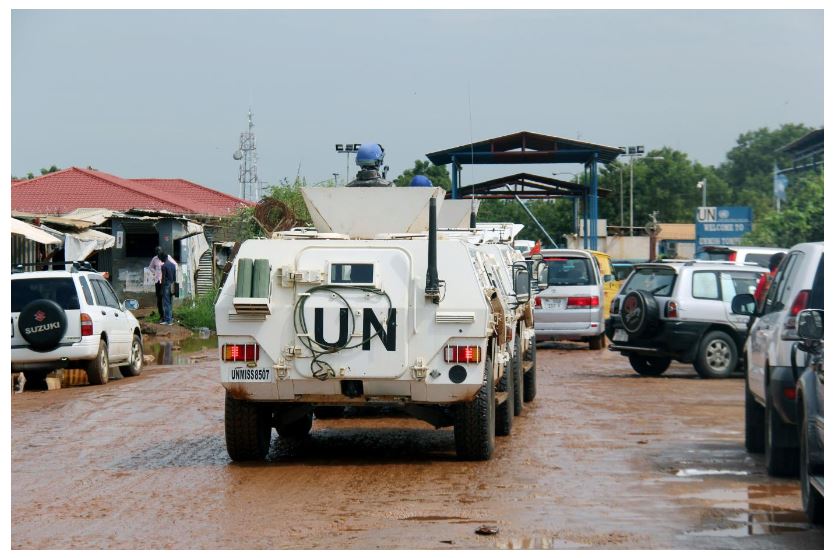
A historic court order for a former United Nations peacekeeper to pay child support for a daughter he fathered while stationed in Haiti raises hopes for dozens of other mothers seeking similar claims worldwide, the woman’s lawyers said.
A judge in Jacmel, a port in southern Haiti, ordered an Uruguayan peacekeeper to pay 350,000 Haitian gourdes ($4,320) a month in child support to a woman he impregnated, according to a ruling seen by the Thomson Reuters Foundation.
“This is an important ruling that speaks to the Haitian judicial system’s capacity and willingness to hold U.N. peacekeepers to account for their actions,” said Sandra Wisner, a senior attorney who worked on the case.
The ruling is part of a three-year legal battle by 10 Haitian women who each filed individual claims to force men from the U.N. Stabilization Mission in Haiti (MINUSTAH), which ended in 2017, to contribute to the upbringing of their children.
The human rights group Bureau des Avocats Internationaux in Haiti and the U.S.-based Institute for Justice & Democracy in Haiti (IJDH), who have given legal support to the women since 2017, said it was a “crucial step towards justice”.
“This is the only favourable judgment we have received to date … the case may encourage similar claims around the world,” said Wisner of IJDH, adding that the ruling was handed down in December but was not made public until recently.
“It is now up to the U.N. to uphold its obligation to facilitate this ruling and establish a clear mechanism for enforcement in Uruguay.”
Hundreds of women in countries where U.N. troops are deployed, from Mali and the Central African Republic to the Democratic Republic of Congo, are seeking child support in paternity claims from U.N. peacekeepers, according to the IJDH. ‘PRIORITY COLLECTIVE EFFORT’
Farhan Haq, the deputy spokesman for the U.N. Secretary-General, described the ruling in Haiti, where children born to U.N. peacekeepers are nicknamed Petit – French for small – MINUSTAH, as “very important”.
“The U.N. has cooperated to facilitate the administration of justice in this case, providing critical documentation and information to the mother herself as well as to the relevant national authorities of Haiti,” Haq said in emailed comments.
Paternity issues are not the only problems facing MINUSTAH, which set out to restore stability after a 2004 coup and helped rebuild Haiti after a devastating earthquake in 2010.
There have been multiple reports of sexual contacts – and several rape claims – involving peacekeepers, with girls as young as 11 being impregnated and abandoned with their babies, found a 2019 study in the journal International Peacekeeping.
Sexual relationships between peacekeepers and residents of countries hosting a U.N. mission are strongly discouraged under the U.N.’s “zero-tolerance policy” for sexual exploitation and abuse.
According to data on the U.N.’s website about the conduct of its field missions, it has received 324 paternity claims worldwide since 2010 from women who have become pregnant as a result of sexual exploitation and abuse by peacekeepers.
The U.N. can investigate crimes and send peacekeepers home but it has no power to prosecute individuals.
“Combating sexual exploitation and abuse perpetrated by personnel serving under the United Nations flag is a priority collective effort for the United Nations,” Haq said.
The U.N. appointed a Victims’ Rights Advocate in 2017 to lead its global efforts to support victims of sexual exploitation and abuse by its personnel, and works to facilitate paternity and child support claims, Haq said.
In Haiti, an advocate works to ensure “victims can report with confidence, access assistance and receive timely information on the status of their complaints” and that they receive documentation required to support their cases, he said. DNA TEST RESULTS
Lawyers at IJDH say dozens of mothers on the Caribbean island, the poorest country in the Americas, are struggling to bring up children fathered by U.N. peacekeepers from Uruguay, Argentina, Nigeria, and Sri Lanka who have returned home.
The world body says its peacekeeping arm does not take responsibility for financial assistance to children fathered by peacekeepers.
In practice, this often means mothers must raise children alone in some of the world’s poorest, most troubled nations.
Haiti is in turmoil, with surging gang violence and anti-government protests exacerbating a humanitarian crisis in a country where two-thirds of people make less than $2 per day.
Haq said the U.N. has received 32 paternity claims from Haitian women since 2007, all of whom have been given help, such as school fees and facilitation of legal assistance, including the mother in the court case.
“We have provided several Haitian mothers with DNA test results received from the State of the nationality of the fathers or alleged fathers of their children,” he said.
“The aim is to support the resolution of the mothers’ claims,” he said, adding that the U.N. also established contact between victims and state authorities, and liaised with member states to follow up on pending claims.
“We continue to call on those who fathered these children in Haiti to assume their individual parental responsibility towards them. Thus far, only a very few have acknowledged their paternity or provided support to these children,” Haq said.

